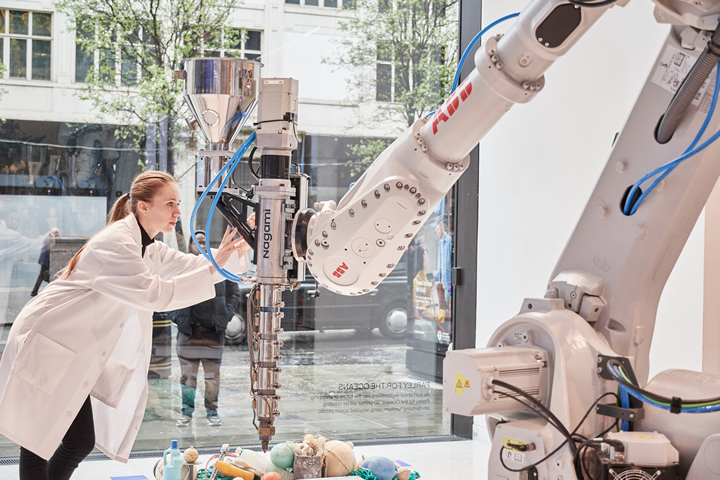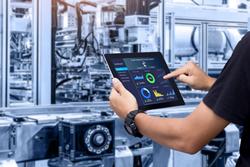ABB Robotics showcases future of retail using recovered marine plastic at London’s Selfridges

The future of retail is being highlighted by an exciting 3D printing demonstration featuring an ABB robot in Selfridges, one of London’s premier department stores on Oxford Street. Throughout April the demonstration will feature in a window display an ABB robot 3D printing a variety of personalized designer objects made from Parley Ocean Plastic® – intercepted marine plastic debris collected from Parley’s Global Cleanup network.
The 3D printing demonstration is part of Selfridges’ SUPERMARKET concept, which challenges consumers to think about how the goods they purchase are produced and the impact of this production on the environment.
“While expanded choice is great for consumers, it also comes at a cost to the environment, with products and packaging often being discarded with little thought about where they end up or whether they get recycled,” says Marc Segura, ABB’s Robotics Division President. “By re-using plastic from the world’s oceans to print designer objects, we help to highlight the important contribution of robots in creating the sustainable manufacturing processes central to a circular economy.”
Developed in partnership with environmental organization and global network, Parley for the Oceans, and innovative design brand Nagami, the demonstration will use ABB’s simulation software RobotStudio® and an IRB 6700 robot to create a variety of printed furniture, homeware, and other objects made from Parley Ocean Plastic. The robot will work with Nagami’s unique plastic extruder to print the objects, which can be selected by customers on a screen and made to order on the premises.
“Parley Ocean Plastic was invented to catalyze change in response to marine plastic pollution and the destruction of our oceans,” says Parley founder and CEO Cyrill Gutsch. "Working with two industry leaders, ABB and Nagami, we can now print on demand anywhere in the world to turn a problem into a solution. Beyond the huge potential for reducing waste by printing directly inside retail locations like Selfridges, we want to use this technology to empower local communities across the globe – giving them the tools to turn local plastic pollution into business opportunities and useful objects. For the oceans, climate and life.”
Robotic transformation of the retail experience
As well as underlining the importance of eco-innovation, the demonstration will also help to highlight the wider potential of robotic automation in helping retailers attract customers into their stores. Robots are already being used in increasing numbers in inventory and delivery management and in-store services, with research organization Coherent Market Insights1 estimating a 30 percent growth in the uptake of robots in retail by 2028.
“Robots are increasingly used to help draw customers back to the high street,” says Segura. “We believe that future adoption will be influenced by three main trends including micro-fulfilment, where robots are used in-store to enable order fulfilment and delivery; personalization, where a robot makes a product to a customer’s specific requirements, with the added option of automatic personalization where data on previous purchasing habits is used to offer new choices; and ‘retailtainment’, where the robot is used as part of an interactive display or show to inform or entertain customers.”
One example is ABB’s robotic demo at German fashion retailer Solebox’s store in Berlin, which picks shoes selected by customers using a screen. If the shoe doesn’t fit or the customer would like to try something else, the robot picks it up from the drawer and returns it to the shelf. In China, a retail kiosk developed by Chinese mobile communications company, Huawei in conjunction with ABB, allows customers to collect a range of devices including smartphones and tablets. Designed to be situated in high street locations, the kiosk uses ABB’s FlexBuffer system to select devices either ordered online or purchased onsite. Once selected, the products are placed into a collection drawer for the customer to take away.
“The ability to introduce robots into their stores both behind and in front of the counter offers exciting opportunities for retailers,” concludes Marc Segura. “By using robots to handle in-store micro-fulfilment operations, staff can be released to people-facing roles, allowing them to focus more on providing customers with a better all-round experience.
“As demonstrated by the installation at Selfridges, robots can also be used on the shop floor to enable personalized production of goods at the point of consumption, adding a whole new dimension to the retail experience.”
This new customer segment broadens ABB’s portfolio as part of a wider strategy to accelerate expansion into new and high-growth segments including logistics, healthcare, and construction.
1 https://www.coherentmarketinsights.com/market-insight/retail-robots-market-4535
ABB (ABBN: SIX Swiss Ex) is a leading global technology company that energizes the transformation of society and industry to achieve a more productive, sustainable future. By connecting software to its electrification, robotics, automation and motion portfolio, ABB pushes the boundaries of technology to drive performance to new levels. With a history of excellence stretching back more than 130 years, ABB’s success is driven by about 105,000 talented employees in over 100 countries. www.abb.com
ABB Robotics & Discrete Automation is a pioneer in robotics, machine automation and digital services, providing innovative solutions for a diverse range of industries, from automotive to electronics to logistics. As one of the world’s leading robotics and machine automation suppliers, we have shipped more than 500,000 robot solutions. We help our customers of all sizes to increase productivity, flexibility and simplicity and to improve output quality. We support their transition towards the connected and collaborative factory of the future. ABB Robotics & Discrete Automation employs more than 11,000 people at over 100 locations in more than 53 countries. go.abb/robotics
About Parley for the Oceans
Parley for the Oceans is the global network where creators, thinkers and leaders from the creative industries, brands, governments and environmental groups come together to raise awareness for the beauty and fragility of the oceans and collaborate on projects that can end their destruction. The organization has formed alliances with major partners including adidas, Anheuser Busch InBev (Corona), American Express, the Republic of Maldives, the United Nations, the World Bank and collaborators spanning the worlds of science, art, fashion, design, entertainment, sports, space and ocean exploration. Learn more and join the movement at www.parley.tv
About Parley Ocean Plastic®
Ocean Plastic® is Parley’s range of premium materials – created from upcycled marine plastic debris and fishing gear recovered from remote islands, coastal communities and shorelines by Parley’s Global Cleanup Network and our partners.
Comments (0)
This post does not have any comments. Be the first to leave a comment below.
Featured Product

